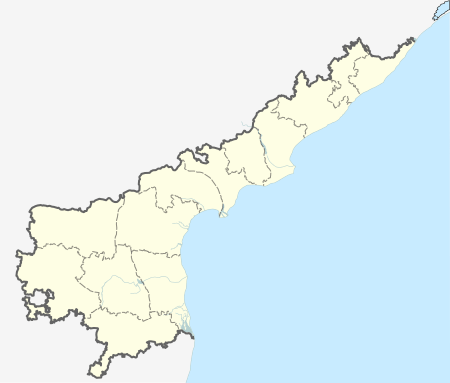Guttikonda Bilam
| Guttikonda Bilam | |
|---|---|
 | |
| Location | Guttikonda, Andhra Pradesh, India |
| Coordinates | 16°23′42″N 79°49′41″E / 16.395°N 79.828°ECoordinates: 16°23′42″N 79°49′41″E / 16.395°N 79.828°E |
| Elevation | 157 m |
Guttikonda Bilam, also known as Guthikonda Bilam, is a historic cave and a pilin Andhra Pradesh, India. Guttikonda or Guthikonda is the name of a nearby village, while "Bilam" is the Sanskrit word for "cave". There are several caves in the region, collectively known as "Guthikonda Caves"; Guttikonda Bilam is the most well-known of these caves.[1]
The cave is located around 3 km south of the Guttikonda village, which lies 23 km from Gurazala, in the Guntur district.[2]
Religious importance
The Guttikonda Bilam is said to be the resident of the legendary sage Muchukunda. According to the folklore, there are about 108 caves in the area, of which only 5-6 can be visited easily.
There is a Palanati Nagamma Statue at the cave entrance. The area has several temples, including the ones dedicated to Muchukunda Maha Muni, Anjaneya Swamy, Sri Raja Rajeswari Devi, Siddhi Vinayaka Swami, Bala Malleswara Swami, Nava Grahalu and holy snakes. There are also several tombs, of Yogini Kola Peramambha and other people who served pilgrims at this place. The cave has several Shiva Lingas like Chikati Mallayya.
History
Palanati Yuddam was fought in 1182AD at Karempudi 20 km from Guttikonda bilam. Palanati Bramha Naidu and his 66 brave warriors have stayed in Guttikonda bilam during the period. Located in the midst of verdant forests, Guthikonda caves will interest tourists as they are magnificent natural formations that will enable you to appreciate the inconceivable creations of nature. The enchantment of the caves is enhanced when you get to know that once upon a time, these caves were inhabited by people belonging to prehistoric times. Archaeological excavations have unearthed a sword holder from these caves belonging to the antediluvian era. A photograph of Guttikonda bilam entrance is published in Palanati Veerula Charitra by Dr.P.V.Acharya.
Geology
The cave (16°23′42.4′′N, 79°49′38.97′′E; elevation 160.7 m) lies at the foot of a hillock in the dense forests of the Nallamala Hills of Eastern Ghats. It is said to have about 11 chambers, with seven passages at the ground level. The south-facing entrance of the cave (2.3 m long, 1.5 m wide) is lined by reinforced concrete and paved with steps, leading into a spacious, descending chamber (c. 50 m wide, 15 m high, and 90 m long) (Gebauer, 2003). The huge and high roof descends more rapidly than the floor, giving rise to a pool of about more than 1 m depth. The roof is composed of rock with mica schist and limestone. The floor is uneven, with a thick layer of gravel and some huge boulders.Some abiotic parameters, as determined on 16 January 2009, were as follows: air temperature 33 °C; water temperature 25 °C; pH 8.2; dissolved oxygen 6.2 mg/l; salinity 0.47‰; conductivity 713 μS; and turbidity 0.87 NTU.[3]
Biology
No publications report on the biology of the cave till 2008. It was Mr. Shabuddin Shaik, an enthusiastic M. Sc zoology student of Acharya Nagarjuna University, who discovered tiny milky white creature for the first time in cave Guthikonda. Later isopod taxonomist decided to open a new chapter in Indian Phreatoicidea and identified as a new genus and species and named as Andhracoides shabuddin in honor of Mr. Shabuddin Shaik by naming the new species for "his child-like curiosity and inherent scientific interest at Taxonomy, Biodiversity & his concern for environment."
The plankton samples of the cave pools, however, yielded only a dense population of stygophilic Mesocyclops sp also during his first visit.
References
- ↑ Guntur District, National Informatics Centre
- ↑ Manohar Sajnani (2001). Encyclopaedia of Tourism Resources in India. Gyan Publishing House. pp. 33–. ISBN 978-81-7835-018-9.
- ↑ Wilson, G.D.F. and Y. Ranga Reddy. 2011. Andhracoides shabuddin gen. nov., sp. nov., a new phreatoicidean isopod (Crustacea, Hypsimetopidae) from hypogean aquatic habitats in Andhra Pradesh, India. Zootaxa 2869: 37-53